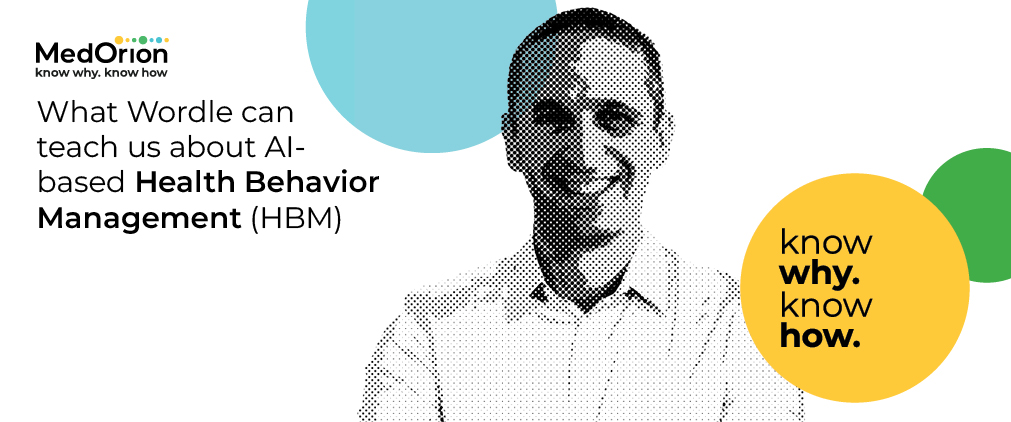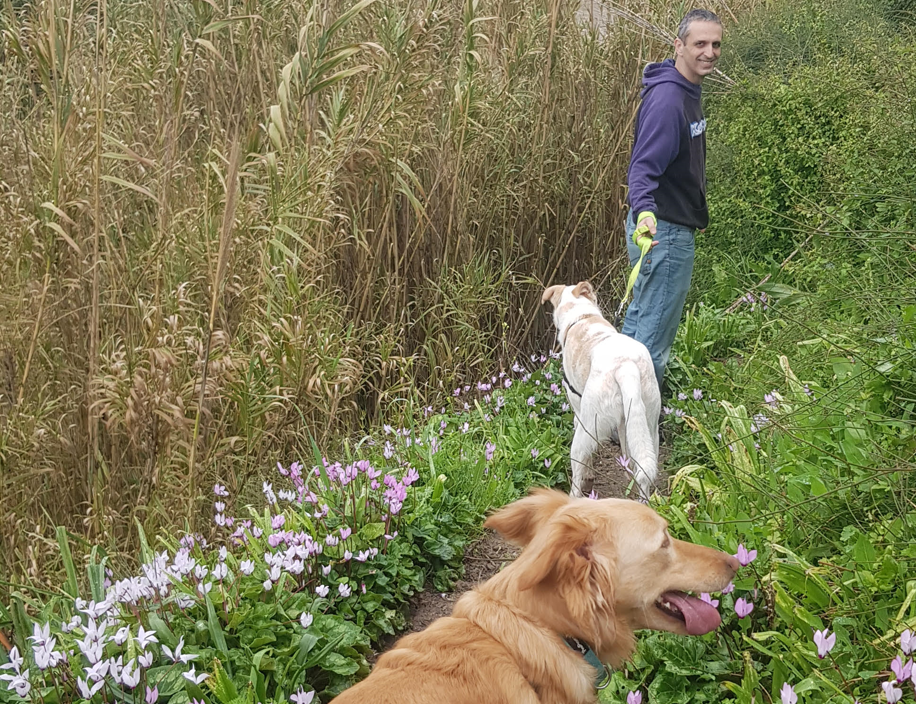What Can Wordle Teach Us About AI Based Health Behavior Management?

By Paz Holender VP Product, MedOrion Technologies
I walked into the office last Wednesday morning when the thought struck me. “MedOrion is like that new Wordle game!” My coworkers looked at me like I was crazy.
“Health Behavior Management (HBM) platform, that empowers health plans to know the motivation behind their member’s health choices, is not the same as the popular word quiz.” They said.
“It’s not the same, but it does help to understand how HBM works,” I countered.
“Prove it,” they said. So here goes nothing….
Wordle Rules the World
I’m going to blame it on my dogs. Every morning I take them to the dog park to run around. Unlike children, dogs don’t need much attention while they’re at the park so it gives me at least 20 mins every morning with not much to do besides watch them run around.
Obviously, there was only one thing to do ….. Wordle.
At the beginning of the year, the world was divided up into two groups, the people who played Wordle posting their results on social media, and the people who didn’t and wished the others wouldn’t.
Just in case you’ve been living under a rock, Wordle is an online language quiz where you have 6 guesses to find the correct 5 letter word. For each guess, the squares on the board change color to indicate whether the letter you chose was in the correct location, found in the world in another location, or not in the word at all.
As any Wordle fan will tell you, sometimes one word per day is not enough, not when the dogs take a full 20 mins to run around. Soon enough my friends and I started sharing Wordle alternatives with each other.
There’s Wordle Unlimited that lets you play as often as you want, so you don’t have to wait until the next day for a new word. Or if you’re a Sci-fi nerd you can try Star Wordle which uses only vocabulary from the Star Wars franchise.
AI- Powered Wordle
My personal favorite is Semantle. There’s even a Hebrew language version. Semantle takes Wordle to a whole new level. You need to find a word that could have any number of letters and is one of the 5,000 most common words in the English language. So it could be anything!
That’s the fun part. You start by guessing a word at random. Then the Semantle system gives you a similarity score, letting you know how close you are to guessing the correct word. The score is based on the meaning of the word, not the way it is spelled.
For example, if the word was ‘teacher’ and you put in ‘building’ then you’d receive a higher similarity score than if you guessed ‘turquoise’ because a teacher works in a building so it has greater relevance than the color.
You keep guessing and watch the similarity score change. With each guess, you hope that you’ll get closer to the elusive answer.
Semantle is powered by the open-sourced Word2Vec algorithm. Put really simply, Word2Vec is an AI algorithm that categorizes words based on where they have appeared together in the past. This can be used to establish a word’s meaning based on those past appearances or to classify words by topic.
Less simply, Word2Vec is a ‘two-layered neural net that processes text by ‘vectorizing’ words’. It turns text into a numerical format that can be understood by deep neural networks. By classifying every time a particular word occurs next to any other word, Word2Vec is able to group words together and make associations between them.
The connections made by the Word2Vec algorithm allow the Semantle game to give you a similarity score. It’s Word2Vec that defines which words are similar.
When HBM is like a Word Game
Did you guess the connection between Wordle and Health Behavior Management? I cheated slightly, it’s really Semantle that’s similar to HBM.
Semantle uses AI to find correlations between words and give you an indication of the connection between the word you guessed and the correct answer.
MedOrion’s Health Behavior Management goes far beyond that. We call the relevant part of our algorithm Member2Vec. We are able to use our neural network to make correlations in member health data. Using behavioral classification based on empirical research in behavioral science, we are able to know certain baseline ‘rules’ about members’ healthcare motivations. Comparing those against real-world data provided by our clients, we classify members and identify their health behavior drivers to action.
Where HBM goes far beyond Semantle is that we can ‘fill in’ the information if a particular member is missing healthcare data. By correlating members’ health records, our AI is able to create ‘lookalike’ comparisons with classified members, who did have enough data available. MedOrion is able to make the association between members to create a similarity ranking, similar to Semantle. That is used to extrapolate the most likely barriers to health action for each member. We then test those classifications and use the results to further refine the analysis.

Why Does it Matter?
You could argue that the whole appeal of these word games is that they don’t matter. In a post-pandemic world, there is something blessedly simple and wholesome about doing online word quizzes with your friends. It is nice to do something that has no hidden agenda and no purpose besides mental stimulation.
On the other hand, health behavior management matters very much. MedOrion has helped partners prompt their members to significantly improve their engagement, seeing a 30% savings in associated costs. We can quantify the savings seen by the health plans, but the lives saved through the correct health actions being undertaken are harder to pinpoint.
When harnessed for the cause of improved healthcare, the ability of an AI algorithm to classify millions of data points and make associations with an accuracy that would defeat any human is a driving force in giving longer, healthier lives to millions.
Seems Like I’m Not Crazy After All..
Once I had explained all of that to my colleagues, they stopped looking at me like I was crazy and I might’ve seen one of the ML team with Semanle on his phone at lunch, so I feel like my reputation has been restored.
What I didn’t tell them is that one of my dogs has had an ear infection for the past 2 weeks, so although I haven’t been to the dog park, I still found half an hour each day to play Semantle. Today I solved it in 86 guesses!